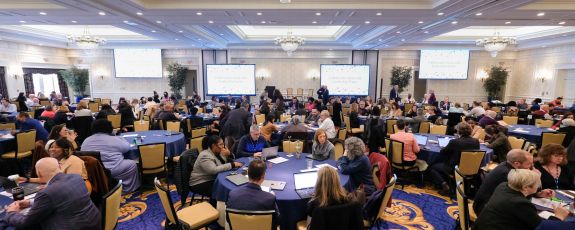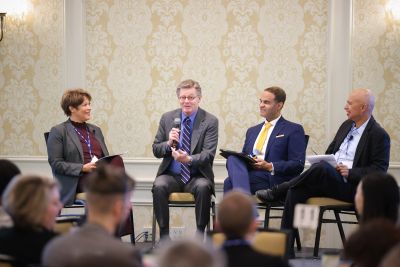
Deadline to Complete Campus Culture Survey Now Extended to March 17
Duke faculty, staff and students encouraged to participate and share their experiences

The survey will be distributed by email on Jan. 29, Clyde said, speaking last week at the third annual leadership retreat on campus culture sponsored by the Office for Faculty Advancement and the Office for Institutional Equity. Responses will be accepted through Feb. 16.
A robust 12,700 faculty, staff and students responded to the 2021 survey and organizers are hoping for even more responses this time around. Several changes will improve access to the survey, and organizers hope to have a Spanish language version available by the launch, Clyde said.
And while the survey includes questions about race, ethnicity and gender, it is written to help university leaders understand how various aspects of identity affect the experience of all Duke community members. Many questions will address pay equity issues faced across the board.
No individually identifiable results will ever be published.
Part of a larger university effort to address equity issues launched by President Vincent Price in his message in the summer of 2020, the 2021 survey found general satisfaction in campus culture, but also evidence of significant problems. More than half of Black, Hispanic, Asian, female, and LGBTQ+ members of the Duke community reported having experienced microaggressions in the past year. Other results showed Black and Hispanic community members believed they had fewer opportunities for career advancement and were underpaid for their work.
Following the survey, the Racial Equity Advisory Council established by Price in 2020, supported university units in encouraging responsive action at both the university and the grassroots level.
“This information shows we have made significant gains. It is a living document, and it’s an opportunity for all of us to use it and to learn from what others are doing.”
Sherilynn Black
And the Duke community responded. A 170-page report presented at last week’s leadership retreat, collected from information from across campus, provided a snapshot of efforts by departments, institutes and administrative units to address problems they identified in their own programs.
Presenting the report to the more than 300 people in attendance at the retreat last week, Sherilynn Black said the community could take hope from the number and quality of responses, although noting that more work still needed to be done. By sharing the information, Black said she hoped it could spur even more work.

“With the first Duke Campus Culture Survey, we realized that the racial and ethnic identities on campus were leading to different experiences at Duke,” Black said. “This information shows we have made significant gains. It is a living document, and it’s an opportunity for all of us to use it and to learn from what others are doing.”
Survey organizers added that the greatest hindrance to taking the survey is the belief by some employees that nothing will ever change, and their voices don’t matter. The evidence from the document should ensure community members that they are making a difference.
The reports showed culture change came in a variety of ways. For many it started with reviewing internal practices to address discrimination or to improve career opportunities for all. One example: Duke’s division of Laboratory Animal Resources, upon finding patterns in employee turnover linked to age differences, created career ladders to support their diverse workforce, increase retention and reduce turnover.
Academic departments took a variety of steps, such as reviewing curriculums and expanding outreach to Historically Black Colleges and Universities to boost educational opportunities for students there. Several units expanded mentoring opportunities connecting students to alumni; these were particularly valuable for scholars from underrepresented groups but benefited all students.
-- In Trinity College, the Department of Mathematics instituted an annual Bystander Intervention Training session for faculty, graduate students and staff that empowers participants to recognize and deal with bias to promote an environment where everyone can flourish.
-- At the Fuqua School of Business, a racial equity scorecard is published annually to help track progress in areas of representation, curricular and co-curricular activity, faculty research and work in the community.
-- Administrative units also showcased change. At the Office of Information Technology, a staff-led initiative called DiversifyIT, which predates the 2021 survey by two years, continues to provide a forum to ensure that staff in IT feel “seen, heard and acknowledged.”
-- For some units, culture change also meant incorporating equity ideals to improve the effectiveness of their work and to benefit a larger community. Clinical Research Institute, which provides advice to the U.S. Food and Drug Administration on clinical trials, created recommendations to increase diversity in clinical trials. The goal is to provide more effective health policies that better serve a wider population while also helping researchers to better understand health disparities.
Change is also happening at the university level. In one important example, Executive Vice President Daniel Ennis pointed to the regular salary equity meetings he has with human resources officials to reduce pay inequities. “People don’t see that, but it’s making a difference,” Ennis said.
“Universities are a place where we can disagree without being disagreeable. We have the ability to solve these problems in a way no other entity can because of the breadth of our perspectives.”
Provost Alec Gallimore
At the retreat, university leaders emphasized the effort on building a supportive culture for all members of the community is foundational to excellence. “Doing this work will emphasize the innovations and creativity in your units,” said Kim Hewitt, vice president for institutional equity. “Duke can only be its best when we leverage the full range of talent available to us.”
“Diversity isn’t just a nice thing to have; this work is core to our mission to attract the broadest minds and doing it in a way that taps that resource that no other sector of society does,” Provost Alec Gallimore said. “The challenges that society faces span throughout humanity. But universities are a place where we can disagree without being disagreeable. We have the ability to solve these problems in a way no other entity can because of the breadth of our perspectives.”
President Vincent Price emphasized that at its core, equity work is a matter of living up to the foundational university values. He listed four characteristics that he hoped would represent the university:
“Our work is best when characterized by humanity,” Price said. “We're trying to be a humane institution … people who deserve respect, deserve to be treated as an individual, not have to represent another group. We start with that principle.
“It also should reflect honesty. It's difficult to be honest because we feel vulnerable, but it doesn't mean we should pull back. Including whether some criticisms of higher education are fair.
“We also have to be humble enough to say we don't have all the answers. We have failings, and when we don't get it right, we have to back up and say, we’ve made mistakes.
“Finally, it should be built on hope. It may appear to be a bleak moment nationally, but we can’t abandon hope. When we get together, share stories, we have accomplished a lot.”

